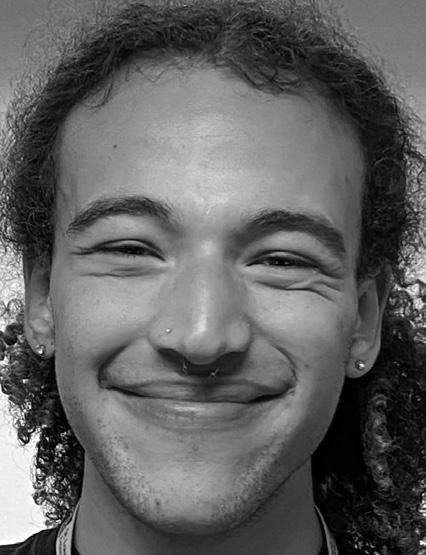
2 minute read
OSCAR NOMINEES?
Everardo Avila Jr., basic needs support specialist
“If I had to choose somebody, I would say my favorite nominee is Angela Bassett for best supporting actress. My other one is ‘Top Gun: Maverick’ (best picture nominee).”
Advertisement
By Markell Tompkins
Kay Matthews, 19, nursing
“I don’t know, but I like Tiffany Haddish, Betty White and Sarah Paulson (not nominated).”
Rashad Jones, 21, science engineering

“I don’t have one. I guess if I had to pick a movie … I don’t know. It’s pretty hard to pick just one.”
C.J. Cook, writing tutor

“From this year, I did really like ‘Everything Everywhere
All at Once’ (best picture nominee). I thought that was really good. For best horror movie, I’d pick ‘Barbarian’ (not nominated). I think it’s a great commentary on white flight and gender dynamics and cancel culture and stuff like that.”
Delia Rainer, writing tutor
“The only movie I saw that’s on (the Oscar list) is ‘Elvis.’ I really liked it, and I see that the main actor who played Elvis, Austin Butler, is nominated for best actor in a leading role, and I totally think he should win. He was super good as Elvis. I really recommend that movie. It’s an explosion of sensory experiences and a really interesting exploration of music history.”

La Toya Smith, enrollment administrator

“If I had to choose a favorite, I’d say Sidney Poitier. He won an Oscar (for best actor in 1964 for ‘Lilies of the Field’). He is an EGOT (Emmy, Grammy, Oscar and Tony) winner, along with Viola Davis. Quincy Jones is another, for his music.”
Annie Kullman, 23, funeral services

“I don’t know. It’s hard to say. I haven’t really watched any new stuff that’s come out.”

Marijuana
Williams also likes the idea that people will no longer go to jail on drug charges related to pot.
“Other states have legalized it already, and we have been battling this for so long,” he said. “You know, California was one of the first, and I think it should be legalized in all 50 states. It’s not a bad drug, and it helps people.”
Adjunct psychology professor Masen Wilkinson has yet another perspective on the topic. He formerly worked at three locations of Swade Cannabis, which dispensed medical marijuana in Missouri after it became legal in 2018.

Each location varied in traffic and clientele, according to Wilkinson. Ellisville was consistently steady, if not busy, serving patients ranging from 14 to 90. The Delmar Avenue location drew a younger crowd, mostly 25 to 30, and business tended to be slower during the day.
Wilkinson described the Cherokee Street location as “super interesting,” with a variety of customers.
“I think that as we have access to more information regarding the benefits of marijuana (in coping) with the stresses of everyday life, we will see a decrease in the amount of alcohol consumed by the younger crowds,” he said. “We have seen what alcohol does to people, and we want to do things differently.
“I feel that this is the spirit of the ’70s coming back, because we are anti-war and pro-weed.” from page 1 Confer
On the negative side, Wilkinson argues that the new Missouri marijuana law isn’t equitable, and it doesn’t allow enough Black people to share in the profits.
St. Louis Public Radio reported that only three out of 192 dispensary licenses were obtained by Black Missourians. Some blame “exorbitant” application fees.

“Until we see actual equity in cannabis, it will continue to put money in white people’s pockets and Black people in prison, or worse, for doing the same thing.
“I do have faith, however, that we will see this change as more Black St. Louisans attain access to this extremely lucrative capital venture. … So I have faith that the people out there fighting for equity in this space will be successful very soon.”
Illustrator at work






